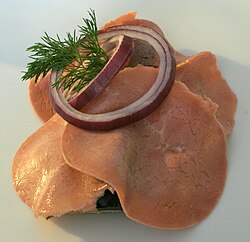Dyrlægens natmad: Difference between revisions
Content deleted Content added
Luckas-bot (talk | contribs) m r2.7.1) (robot Adding: no:Dyrlægens natmad |
mNo edit summary |
||
| (28 intermediate revisions by 21 users not shown) | |||
| Line 1: | Line 1: | ||
{{Short description|Danish open-faced sandwich}} |
|||
[[File:Ida Davidsen - Dyrlægens Natmad.jpg|thumb|right|Danish [[smørrebrød]] - "Dyrlægens Natmad".]] |
|||
{{Infobox prepared food |
|||
| ⚫ | |||
| image = Ida Davidsen - Dyrlægens Natmad.jpg |
|||
| image_size = 250px |
|||
| caption = |
|||
| alternate_name = |
|||
| country = [[Denmark]] |
|||
| region = |
|||
| creator = |
|||
| course = |
|||
| type = [[Sandwich]] |
|||
| served = |
|||
| main_ingredient = [[Smørrebrød]], [[meat]] |
|||
| variations = |
|||
| calories = |
|||
| other = |
|||
}} |
|||
'''Dyrlægens natmad''' ("veterinarian's night food") is the [[Danish language|Danish]] name for a ''[[smørrebrød]]'', also known as an [[open-faced sandwich]], made with a particular selection of toppings. The name of this snack originated in the 1920s in Oskar Davidsen's sandwich bread restaurant in Copenhagen. According to food historian Nina Bauer the famous sandwich is named after one of the restaurant's regulars, a distinguished veterinarian named Sigurd Kejlgaard, who was employed to look after the horses in the royal stables and the contemporary Circus Miehe. <ref>https://samvirke.dk/artikler/maerkelige-madnavne-hvorfor-hedder-det-dyrlaegens-natmad Mærkelige madnavne: Hvorfor hedder det dyrlægens natmad? (translationː Strange Food Names: Why is it called the vet's night food?) in Samvirke. by Christian Garde 2017</ref> |
|||
'''Dyrlægens natmad''' (Veterinarian's midnight snack) is the [[Danish_language|Danish]] name for a piece of [[smørrebrød]] upon which a particular selection of meats is laid. |
|||
The simplest form of '' |
The simplest form of ''dyrlægens natmad'' consists of a slice of ''[[rugbrød]]'' with a base spread of butter or fat, a layer of ''[[leverpostej]]'', sliced [[salt beef]], meat stock [[aspic]] and red onion rings on top.<ref>Opslag dyrlægens natmad i Fakstorp, Jørgen; [[Else-Marie Boyhus|Boyhus, Else-Marie]], (red.) (1998), Gastronomisk Leksikon, Nordisk Forlag, {{ISBN|87-00-20284-3}}.</ref> |
||
== See also == |
== See also == |
||
*[[Danish cuisine]] |
*[[Danish cuisine]] |
||
==References == |
|||
{{food-stub}} |
|||
{{Reflist}} |
|||
{{sandwhich}} |
|||
| ⚫ | |||
| ⚫ | |||
[[Category:Danish words and phrases]] |
|||
{{DEFAULTSORT:Dyrlaegens natmad}} |
|||
| ⚫ | |||
| ⚫ | |||
| ⚫ | |||
[[Category:Open-faced sandwiches]] |
|||
[[Category:Rye-based dishes]] |
|||
{{denmark-cuisine-stub}} |
|||
Latest revision as of 17:44, 17 December 2023
 | |
| Type | Sandwich |
|---|---|
| Place of origin | Denmark |
| Main ingredients | Smørrebrød, meat |
Dyrlægens natmad ("veterinarian's night food") is the Danish name for a smørrebrød, also known as an open-faced sandwich, made with a particular selection of toppings. The name of this snack originated in the 1920s in Oskar Davidsen's sandwich bread restaurant in Copenhagen. According to food historian Nina Bauer the famous sandwich is named after one of the restaurant's regulars, a distinguished veterinarian named Sigurd Kejlgaard, who was employed to look after the horses in the royal stables and the contemporary Circus Miehe. [1]
The simplest form of dyrlægens natmad consists of a slice of rugbrød with a base spread of butter or fat, a layer of leverpostej, sliced salt beef, meat stock aspic and red onion rings on top.[2]
See also[edit]
References[edit]
- ^ https://samvirke.dk/artikler/maerkelige-madnavne-hvorfor-hedder-det-dyrlaegens-natmad Mærkelige madnavne: Hvorfor hedder det dyrlægens natmad? (translationː Strange Food Names: Why is it called the vet's night food?) in Samvirke. by Christian Garde 2017
- ^ Opslag dyrlægens natmad i Fakstorp, Jørgen; Boyhus, Else-Marie, (red.) (1998), Gastronomisk Leksikon, Nordisk Forlag, ISBN 87-00-20284-3.
